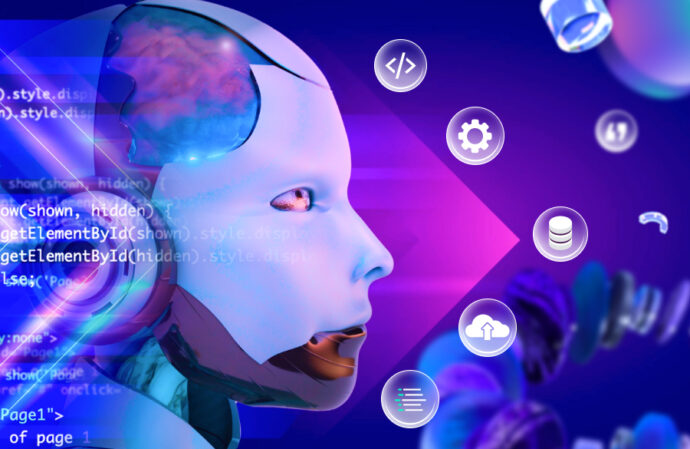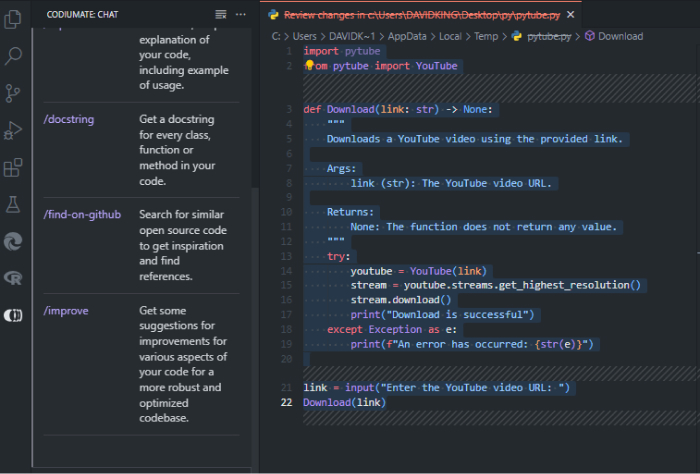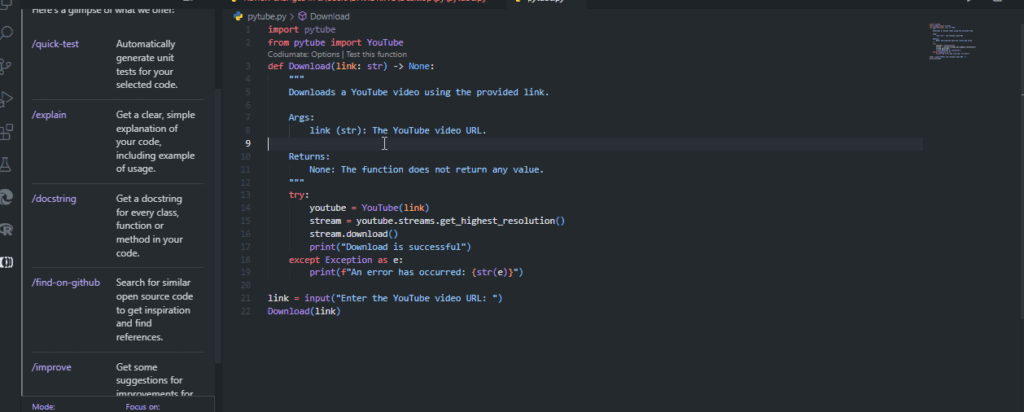
Forget all cryptic error messages. The future of coding is here, and it’s surprisingly useful (and far less messy). AI code generation is like having a coding wizard by your side, whispering brilliant ideas and automating the mundane. It’s time to abandon the struggle and enter a world where progress is faster, smarter, and perhaps even more enjoyable. Buckle up, because this introduction to AI code generation will show you how these clever tools are transforming development and the developer experience.
In this article, we’ll look at how AI is changing code generation, its significance in development, the advantages of AI code generation tools, and the implications of AI writing code for the future of software development.
What is AI Code Generation?
AI code generation is a simple concept but has a complex and deep history. AI code generation is the process of creating code using artificial intelligence (AI). With artificial intelligence becoming better and more efficient daily, the theory of AI code generation does not appear to be an impossible task to accomplish. Although it has been attempted numerous times since the concept of AI’s inception, it has never been fully realized.
There are too many potential benefits to AI code generation to list, but a few key reasons include automation of program development, freeing up human developers to solve more difficult problems, code generation for efficiency enhancements to existing programs, and the development of AI systems themselves.
AI code generation has the potential to revolutionize computer science by introducing new tools and methods for software and theoretical advancements. AI system development is becoming a reality and can be compared to future AI code generation.
Evolution and Impact on Development
Code generation has progressed from simple templates and libraries to complex AI-powered tools that can understand complex requirements and produce high-quality code. This evolution has had a significant impact on development practices, allowing developers to be more efficient and produce better software in less time.
Importance of AI Code Generation in Development
Below are the importance of using AI code generation in development:
- Dealing with Development Challenges: Developing software is inherently complex and time-consuming, with developers frequently dealing with tight deadlines, shifting requirements, and the need to maintain code quality. AI code generation tools help to address these issues by automating repetitive tasks, reducing manual errors, and speeding up the development process.
- Improving Productivity and Efficiency: By automating routine coding tasks, AI code generation tools allow developers to focus on more creative and valuable activities like problem-solving, architecture design, and optimization. This not only increases productivity, but also improves the overall quality of the software under development.
- Improving Code Quality and Maintenance: AI code generation tools can generate code that follows best practices, coding standards, and design patterns, resulting in cleaner and more maintainable codebases.
Benefits of AI Code Generation Tools
Here are the main benefits of using AI code generation tools to boost your productivity:
- Accelerated Development Cycles: One of the primary benefits of AI code generation tools is their ability to accelerate development cycles by automating repetitive tasks and streamlining the coding process. Tasks that would traditionally take hours or days to complete manually can now be accomplished in a fraction of the time, allowing developers to deliver software faster and more efficiently.
- Reduction of Human Error: Manual coding is prone to human error, which can result in bugs, security vulnerabilities, and system failures. AI code generation tools help mitigate these risks by automatically generating code that is more accurate, reliable, and error-free. By reducing the need for manual intervention, these tools minimize the likelihood of costly mistakes and improve overall software quality.
- Enhancement of Developer Creativity: Contrary to the misconception that AI code generation tools replace human developers, they actually complement and enhance their capabilities. By handling routine coding tasks, these tools free up developers to focus on more creative and challenging aspects of software development, such as problem-solving, innovation, and user experience design.
AI Tools for Code Generation
AI code generation tools are available in a variety of forms, ranging from code completion plugins and code suggestion engines to full-featured code generation platforms. These tools use advanced AI algorithms to analyze codebases, understand requirements, and generate code that adheres to specific criteria and standards.
Examples and Applications
Below is an example of an AI website for code generation
Qodo (formerly Codium) Revolutionizing Code Generation: Qodo (formerly Codium) allows developers to create, modify, and maintain code at unprecedented speeds and accuracy. Qodo (formerly Codium) uses machine learning models trained on massive code bases to carefully predict code snippets, refactor existing code, and even generate entire applications from scratch. With features like code autocomplete, intelligent refactoring, and automated testing, Qodo (formerly Codium) is changing the way developers write code and build software.
Before using the Qodo (formerly Codium) IDE extension
An image showing the Qodo (formerly Codium) interface, suggesting code snippets based on user input.
The GIF below shows the process and output from when I instructed the Qodo (formerly Codium) vscode extension to explain my Python code for downloading YouTube videos.
Automatic Code Generation with AI
Automatic code generation with AI involves using machine learning models trained on large amounts of code to understand patterns, conventions, and best practices. These models can then produce code snippets or entire programs based on the input requirements, constraints, and specifications.
Advantages and Opportunities
Automatic code generation offers several advantages, including
- Increased Productivity: By automating routine coding tasks, developers can work more efficiently and focus on higher-level problem-solving.
- Improved Code Quality: AI-generated code adheres to coding standards, best practices, and design patterns, resulting in cleaner, more maintainable codebases.
- Faster Time-to-Market: By accelerating development cycles, automatic code generation enables faster delivery of software products and features, giving organizations a competitive edge in the market.
Challenges and Limitations
However, automatic code generation also presents challenges and limitations, such as:
- Complexity and Scalability: Generating code for complex or large-scale projects can be challenging due to the intricacies of the problem domain and the limitations of current AI models.
- Quality Assurance: While AI-generated code is often of high quality, it still requires thorough testing and validation to ensure correctness, reliability, and security.
- Human Oversight: Despite advances in AI, human oversight and intervention are still necessary to ensure that the generated code meets functional and non-functional requirements and aligns with the developer’s intentions.
AI to Write Code: The Future of Development
Emerging Trends in AI-Driven Code Writing
The future of software development is increasingly reliant on AI to write code, with advancements in natural language processing, code synthesis, and program synthesis enabling more sophisticated and intuitive ways of interacting with machines.
- Potential Impact on Development Workflow: The widespread adoption of AI to write code is poised to fundamentally transform the development workflow, from requirements gathering and design to implementation and testing. Developers will be able to communicate with AI systems using natural language, express high-level intentions, and receive AI-generated code tailored to their specific needs and preferences.
- Opportunities for Innovation and Collaboration: AI-driven code writing opens up exciting opportunities for innovation and collaboration, enabling developers to explore new paradigms, experiment with novel techniques, and collaborate with AI systems to solve complex problems and push the boundaries of what’s possible in software development.
The Role of AI in Writing Code
AI’s role in code writing is not to replace human developers, but to augment their capabilities, increase productivity, and allow them to tackle more difficult and creative tasks. By automating routine coding tasks, AI allows developers to focus on higher-level tasks that require human creativity, intuition, and expertise.
Here is a short descriptive video displaying the role of AI in writing codes using the Qodo (formerly Codium) and Qodo Merge (formerly PR-Agent) tools.
Below is a before and an after of using AI in writing your codes to enhance, explain, expand, and refactor:
Before:
```python
from pytube import YouTube
def Download(link):
youtubeObject = YouTube(link)
youtubeObject = youtubeObject.streams.get_highest_resolution()
try:
youtubeObject.download()
except:
print("An error has occurred")
print("Download is completed successfully")
link = input("Enter the YouTube video URL: ")
Download(link)
```
After using the Qodo (formerly Codium) vscode extension:
```python
import pytube
from pytube import YouTube
def Download(link: str) -> None:
"""
Downloads a YouTube video using the provided link.
Args:
link (str): The YouTube video URL.
Returns:
None: The function does not return any value.
try:
youtube = YouTube(link)
stream = youtube.streams.get_highest_resolution()
stream.download()
print("Download is successful")
except Exception as e:
print(f"An error has occurred: {str(e)}")
link = input("Enter the YouTube video URL: ")
Download(link)
```
The code above shows it has been improved with an AI code enhancer.
Implications for Developers and Organizations
- For developers, AI’s ability to write code means a shift in focus from mundane tasks to more strategic ones. Developers will increasingly become orchestrators of AI-driven workflows, guiding the AI systems, refining their outputs, and integrating them seamlessly into the development process. This transition requires a new set of skills, including proficiency in AI technologies, data science, and natural language processing, as well as a deep understanding of software engineering principles and best practices.
- For organizations, AI-driven code writing offers opportunities for increased efficiency, agility, and innovation. By leveraging AI to automate coding tasks, organizations can accelerate time-to-market, reduce development costs, and stay ahead of the competition. Moreover, AI enables organizations to unlock new possibilities in software development, such as rapid prototyping, code synthesis, and automatic optimization, leading to more resilient, scalable, and intelligent software systems.
Ethical Considerations and Human Involvement
Ethical Issues Surrounding AI Code Generation: As with any technology, AI code generation raises questions and concerns. These include concerns about algorithmic bias, data privacy, intellectual property rights, and the possibility of job displacement. Developers and organizations must be aware of these ethical implications and take proactive measures to reduce risks, ensure fairness and accountability, and maintain ethical standards in AI development and deployment.
Importance of Human Oversight and Intervention: While AI has the potential to automate many aspects of code generation, human oversight and intervention are still necessary. Human developers bring domain expertise, contextual understanding, and ethical judgment to the table, ensuring that the code produced meets quality standards, aligns with business goals, and complies with regulations. Furthermore, human involvement encourages collaboration, creativity, and critical thinking, which promotes innovation and responsible AI development practices.
Ensuring Responsible AI Development Practices
To ensure responsible AI development practices, developers and organizations should:
- Embed Ethics from the Start: Incorporate ethical considerations into the design, development, and deployment of AI code generation systems, ensuring transparency, fairness, and accountability.
- Foster Diversity and Inclusion: Promote diversity and inclusion in AI teams to mitigate bias and ensure that AI systems reflect a diverse range of perspectives and experiences.
- Continuously Monitor and Evaluate: Regularly monitor and evaluate AI systems for bias, fairness, and unintended consequences, and take corrective action as needed to mitigate risks and uphold ethical standards.
Conclusion
AI code generation is transforming development practices and tools, allowing developers to be more efficient, creative, and collaborative. From shortening development cycles and improving code quality to enabling automatic code generation and AI-driven code writing, AI is fundamentally changing the future of software development. To fully realize the potential of AI code generation, developers and organizations must adopt ethical principles, encourage human-machine collaboration, and prioritize responsible AI development practices. By doing so, they can harness the power of AI to drive innovation, solve complex problems, and create software that has a positive global impact.









